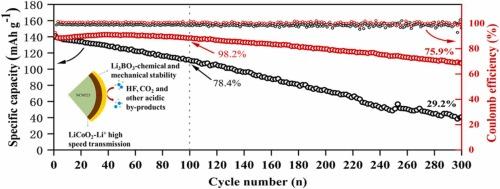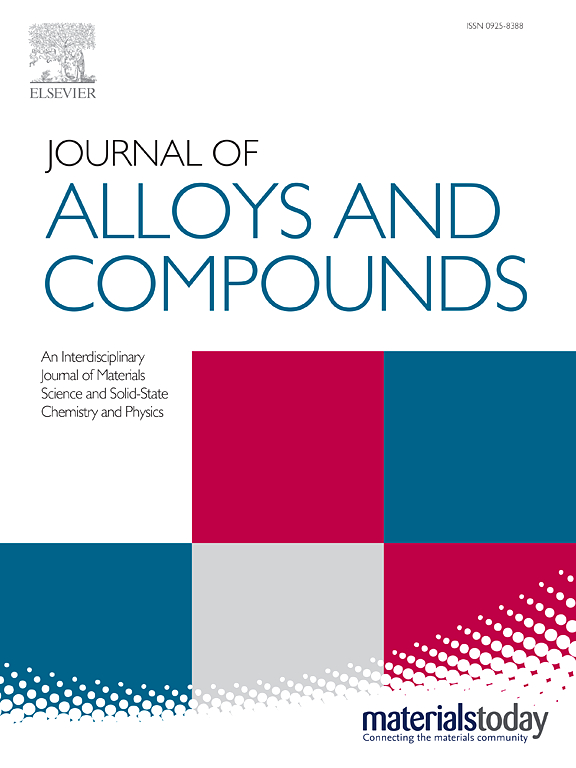Surface engineering with bifunctional layer in LiNi0.5Co0.2Mn0.3O2 for high-performance cathode materials of lithium-ion batteries
IF 5.8
2区 材料科学
Q2 CHEMISTRY, PHYSICAL
引用次数: 0
Abstract
Implementing a stable interfacial architecture with augmented conductivity emerges as a pivotal approach for bolstering the stability of LiNi0.5Co0.2Mn0.3O2 (NCM523) and facilitating expedited Li+ transport. To augment efficiency and foster compatibility with industrial processes, a novel one-step, high-temperature modification technique is introduced for the fabrication of a dual-layer LiCoO2 & Li3BO3 (LCO/LBO) coating on the NCM523. This is achieved through the utilization of nano-CoB particles (nCoB) as a medium to capture LiOH impurities. The special coating architecture not only propels Li+ diffusion at the interphase but also mitigates acid-induced corrosion, thereby preserving the structural integrity of cathode material throughout its operational lifecycle. Owing to this innovative coating, the electrochemical attributes of NCM523 witness significant improvement, demonstrated by a remarkable 98.2% capacity retention following 100 cycles at 1 C, and a sustained 75.9% capacity retention after 300 cycles, a stark contrast to the 29.2% observed with uncoated NCM523. This investigation validates the LCO/LBO coating paradigm as a means to synergistically enhance Li+ translocation across the electrical double layer while countering cathodic structural erosion, offering fresh perspectives in the domain of NCM523 cathode surface enhancement.

在 LiNi0.5Co0.2Mn0.3O2 中使用双功能层进行表面工程,以制造高性能锂离子电池正极材料
要提高镍钴锰酸锂(LiNi0.5Co0.2Mn0.3O2,NCM523)的稳定性并促进锂离子(Li+)的快速传输,就必须采用具有增强导电性的稳定界面结构。为了提高效率并促进与工业工艺的兼容性,我们引入了一种新型的一步高温改性技术,用于在 NCM523 上制造双层 LiCoO2 & Li3BO3 (LCO/LBO) 涂层。这是通过利用纳米 CoB 颗粒(nCoB)作为捕获 LiOH 杂质的介质来实现的。这种特殊的涂层结构不仅能促进 Li+ 在相间的扩散,还能减轻酸引起的腐蚀,从而在整个运行周期内保持阴极材料的结构完整性。由于采用了这种创新涂层,NCM523 的电化学特性得到了显著改善,在 1 C 下循环 100 次后容量保持率达到 98.2%,循环 300 次后容量保持率持续保持在 75.9%,与未涂层 NCM523 的 29.2% 形成了鲜明对比。这项研究验证了 LCO/LBO 涂层范例是一种协同增强 Li+ 在电双层上的转移,同时对抗阴极结构侵蚀的方法,为 NCM523 阴极表面增强领域提供了新的视角。
本文章由计算机程序翻译,如有差异,请以英文原文为准。
求助全文
约1分钟内获得全文
求助全文
来源期刊

Journal of Alloys and Compounds
工程技术-材料科学:综合
CiteScore
11.10
自引率
14.50%
发文量
5146
审稿时长
67 days
期刊介绍:
The Journal of Alloys and Compounds is intended to serve as an international medium for the publication of work on solid materials comprising compounds as well as alloys. Its great strength lies in the diversity of discipline which it encompasses, drawing together results from materials science, solid-state chemistry and physics.
 求助内容:
求助内容: 应助结果提醒方式:
应助结果提醒方式:


